Everyday
Injustice
Everyday Injustice
Latino Professionals and Racism
Maria Chvez
Rowman & Littlefield Publishers, Inc.
Lanham Boulder New York Toronto Plymouth, UK
Published by Rowman & Littlefield Publishers, Inc.
A wholly owned subsidiary of The Rowman & Littlefield Publishing Group, Inc.
4501 Forbes Boulevard, Suite 200, Lanham, Maryland 20706
http://www.rowmanlittlefield.com
Estover Road, Plymouth PL6 7PY, United Kingdom
Copyright 2011 by Rowman & Littlefield Publishers, Inc.
All rights reserved . No part of this book may be reproduced in any form or by any electronic or mechanical means, including information storage and retrieval systems, without written permission from the publisher, except by a reviewer, who may quote passages in a review.
British Library Cataloguing in Publication Information Available
Library of Congress Cataloging-in-Publication Data
Chvez, Maria, 1968
Everyday injustice : Latino professionals and racism / Maria Chvez.
p. cm.
Includes index.
ISBN 978-1-4422-0919-0 (cloth : alk. paper) ISBN 978-1-4422-0921-3 (electronic)
1. Hispanic AmericansEmploymentUnited States. 2. Minorities in the professionsUnited States. 3. Hispanic American lawyers. 4. Hispanic AmericansSocial conditions. 5. RacismUnited States. I. Title.
HD8081.H7C43 2011
331.6'280973dc22 2011009797
 The paper used in this publication meets the minimum requirements of American National Standard for Information SciencesPermanence of Paper for Printed Library Materials, ANSI/NISO Z39.48-1992.
The paper used in this publication meets the minimum requirements of American National Standard for Information SciencesPermanence of Paper for Printed Library Materials, ANSI/NISO Z39.48-1992.
Printed in the United States of America
To my beautiful childrenMariela, Thomas, Michele, and Donny.
May the professional world in America become more accepting
of the next generation of Latinos.
To David Pringle, for a life shared.
Acknowledgments
M y deepest gratitude to the many people who helped make this book possible, especially Supreme Court Justice Charles Z. Smith, Carmen Gonzalez, Dr. Sandra Madrid, Sonia Rodriguez, Lourdes Fuentes, Alejandro Torres, Norma Urena, and Myrna Contreras. Thanks too to all the Latino attorneys who participated in this study and to the comparison group of non-Latino attorneys in Washington who graciously filled out a parallel survey.
I am appreciative of the invaluable feedback on drafts I received from friends and colleagues, especially Joanne Conrad, Ross E. Burkhart, and Sid Olufs, who read and commented extensively on the entire manuscript. It is a much stronger book because of them. I also received helpful suggestions from Eduardo Bonilla-Silva, Kevin R. Johnson, Rodney Hero, Luis R. Fraga, Gary Segura, Ron Schmidt, Kaitlyn Sill, and Lisa Garca Bedolla. A special thanks is due to the three anonymous reviewers; I owe a huge debt to them for their invaluable suggestions. Thanks to the Rowman & Littlefield staff, particularly to Sarah Stanton, acquisitions editor, and Jin Yu, editorial assistant, for being so kind, encouraging, and helpful throughout the publication process. Thanks likewise go to Tali Johnson for her amazing help with the citations and bibliography.
I have been extraordinarily privileged to come into contact with wonderful people in academia, principal among them, Joe Feagin. I am grateful to Joe for writing the insightful foreword to this book, for including it in his Perspectives on a Multiracial America Series , for his support and encouragement throughout the process, and especially for his personal and professional commitment to exposing and ending racism in America. In addition, this project could not have been completed without generous support from a very special personmy dear friend and mentor, Nicholas P. Lovrich. Dr. Lovrich arranged the funding for the surveys and focus groups, assisted me in conducting my first focus group, and helped me in too many ways to list to complete my field research. I will always be grateful to him for his love and guidance over the years. Likewise, I am also very grateful for the support and friendship I received from Luis R. Fraga, another supportive mentor and friend who has taught me much of lasting value.
I am fortunate to have excellent colleagues at Pacific Lutheran University, who make academic life here very rewarding. I would especially like to thank my colleagues Peter Grosvenor, Solveig Robinson, Paula Leitz, Laura Klein, Lynn Hunnicutt, Tamara Williams, Anna Leon-Guerrero, Ann Kelleher, Claudia Berguson, Gina Hames, Joanna Gregson, Teresa Ciabattari, Karen Travis, Kaitlyn Sill, Sid Olufs, Chris Hansvick, Brenda Murray, Carolyn Reed, Norris Peterson, and Steven Starkovich. My heartfelt thanks to my 2010-2011 Wild Hope Seminar for a year of rich conversations and new friendships: Samuel Torvend, Kirsten M. Christensen, Lynn Hunnicutt, Heather Mathews, Eric Nelson, Carmina Palerm, Erin McKenna, and Neal Yakelis. Finally, I feel very privileged to have been hired at PLU by President Loren Andersonthank you for welcoming into the PLU community, for sending me a personal congratulations card when my twins were born, for supporting me through the tenure and promotion process, and most of all, thank you for being such an inspiring and gifted leader at PLU. I wish you and MaryAnn the best.
My love and thanks also go out to Lisa Garca Bedolla, Melissa Michelson, Jessica Lavariega Monforti, Maggie Chon, Russ Lidman, Bitsy OConnor, Gina Hames, Michele Shover, Byron Jackson, Wanda Costen, Ellen Lin, Brian Wampler, Ross Burkhart, Joanne Conrad, and Bridget OMeara. Their support on so many aspects of academic life over the years has been a great source of comfort and inspiration for me. Thanks too to my in-laws, Marolyn and Don, for encouraging me to maintain balance in my life. To my dear sister, Celia Canalia, thanks for being excited over and supportive of all my accomplishments, and for doing the striking cover picture. To my wonderful daughter, Mariela Barriga, thanks for being the beautiful Latina professional on the cover and for all the years of love and frustration that only a mother and daughter can have.
Above all, I owe special thanks to my husband, David Pringle, for his patience and willingness to discuss the book over and over again, for his good nature and constant encouragement, for his pitching in during those precious family times when I would work on weekends and evenings. Thanks, David, for your love and especially for our BooboosThomas, Michele, and Donny.
Foreword
I n this pathbreaking book, Professor Maria Chvez begins Chapter 7 with an extraordinary account, one cutting quickly to a set of major questions about U.S. society: A Latina graduate student asks a political science professor in a seminar about the absence of people of color in a book on American civic behavior. The white professor replies, When are you going to get over your race thing? His tone makes clear obvious irritation and demonstrates his own racial framing of people of color, in this case of a young person trying to make her way through a historically white university. His sharply worded your race thing makes it clear that she and her fellow citizens of color are racially othered and are the societal problem when it comes to raceand not, of course, the persisting, white-generated racist realities of this society.
Indeed, Chvezs interviews with Latino professionals in one of the most distinguished U.S. professions reveal that they still are not accepted by many in the dominant group, that is, by white Americans. They are commonly framed in terms of the stereotypes, images, and emotions of an old white racist framing of Latinos.
Throughout this book, we see the many and varied ways Latino professionals must deal with such racist intrusions and barriers in their everyday lives, from early youth to advanced professional success. Chapters deal in depth with their struggles and successes in education, in the workplace, and in their civic lives. We see them constantly struggling against marginalization, against being seen as unimportant, against being disrespected. The in-depth interviews with Latino lawyers that make up the core of this book constantly point us to the racialized pain of our present and past history.

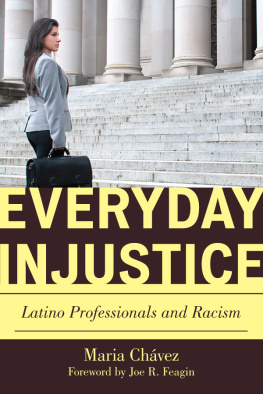
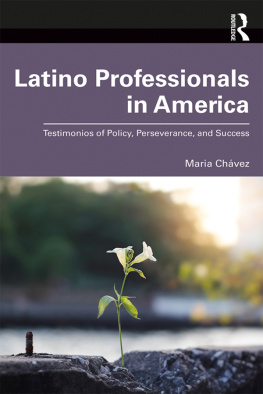

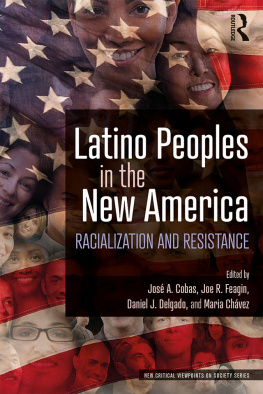
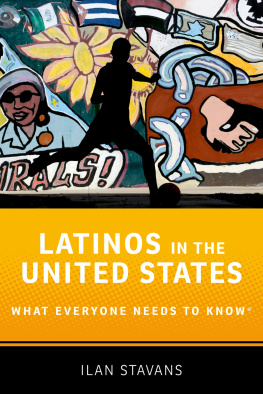


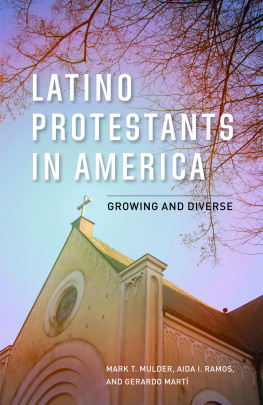
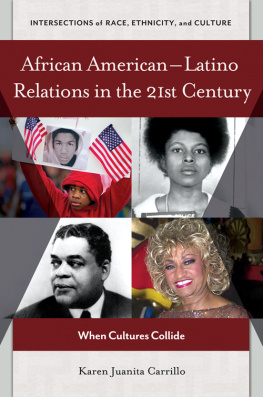
 The paper used in this publication meets the minimum requirements of American National Standard for Information SciencesPermanence of Paper for Printed Library Materials, ANSI/NISO Z39.48-1992.
The paper used in this publication meets the minimum requirements of American National Standard for Information SciencesPermanence of Paper for Printed Library Materials, ANSI/NISO Z39.48-1992.